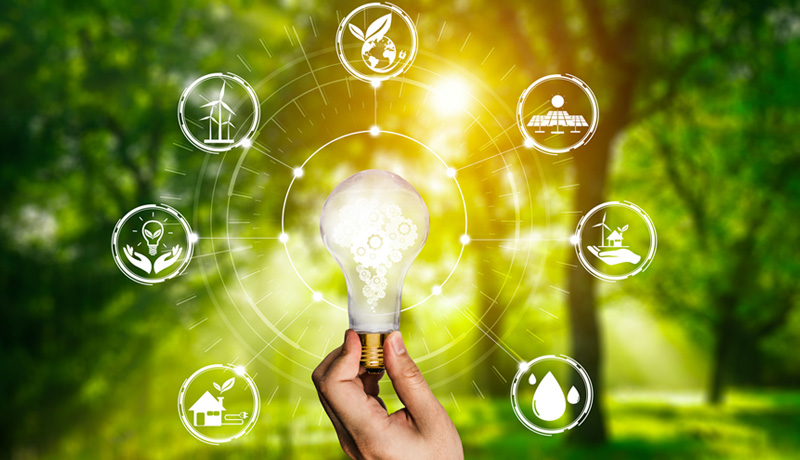


As per the latest statistics made available by the Ministry of New and Renewable Energy (MNRE), India has a total installed renewable energy capacity of 103.05 Gigawatt as of 31st October 2021. Ministry themselves have set an ambitious target of expanding the capacity to 175-Gigawatt capacity by 2022. Prime Minister Narendra Modi has set the national target of non-fossil energy capacity agreed at COP26 Climate Summit in Glasgow from 450 Gigawatt to 500 Gigawatt of renewable energy to be achieved by 2030. The various sources of renewable energy that contribute to this are:
| Type | 2021 (existing) | 2022 (proposed) | 2030 (proposed) |
|---|---|---|---|
| Solar energy | 47.66 GW | 100 GW | 500 GW |
| Wind energy | 39.99 GW | 60 GW | |
| Biopower | 10.58 GW | 10 GW | |
| Small hydro | 4.82 GW | 5 GW | |
| Total | 103.05 GW | 175 GW |
Renewable energy supplies can be classified as either a supply of renewable energy devices and parts for their manufacture or a composite supply of these goods and their installation services.
The renewable energy devices refer to the following:
| Goods under Chapter 84, 85 or 94 | Services under Chapter 99 |
|---|---|
| Biogas plant | Construction services, |
Installation services and Other technical services provided in relation to these goods.
GST on such renewable energy devices is applicable as below:
| Type of supply | 01/07/2017 – 31/12/2018 | 01/01/2019 – 30/09/2021 | 01/10/2021 – till date |
|---|---|---|---|
| Goods falling under Chapters 84, 85 or 94 | 5% | 5% | 12% |
| Any other goods | Applicable GST rates | ||
| Pure Services | 18% | ||
| Composite Supply (except maintenance services) | 8.90%* | ||
*Note 1: The GST rates for the period 01/07/2017 to 31/12/2018 are applicable in terms of the Composite Supply provisions i.e., the GST rate of the principal supply which in this case is the supply of renewable energy devices or parts which is taxed at 5%. However, the 45th GST Council meeting held on 17th September 2021 has explained that it shall be taxed in the 70:30 ratio though the relevant notification is applicable from 01st January 2019. And Circular No. 163/19/2021-GST dated 06/10/2021 states that if the GST paid for this period is higher than the 70:30 ratio then no refunds will be given for the excess tax payment made.
Businesses that manufacture Renewable Energy goods will be eligible to claim the ITC as available to subject to fulfillment of conditions in Section 16 and restrictions in Section 17. Usually, these manufacturers are solely indulged in the manufacture and sale of complete units such as Solar Panels, Wind turbine fans, etc .
Businesses engaged in the procurement and installation of Renewable Energy goods and services shall be eligible for claim of ITC. There is a possibility of inversion of input goods and services in this regard, as the effective GST rate for supply is currently 13.80% whereas the procurement of goods not falling under 84, 85, or 94 and individual services may attract higher GST rates .
Businesses that obtain or procure renewable energy-related goods or services for their business will be eligible to claim ITC as follows:
A. Factories / Commercial buildings:
In the case of renewable energy units, set-up in factories or commercial buildings for captive generation of electricity, then the restriction of Section 17(5)(c) & (d) of CGST Act, 2017 for construction of buildings will not be attracted as such units can be treated on par with ‘Plant and Machinery’ and not ‘Building’.
B. Sale of captively generated electricity:
In case the captively generated electricity is more than the requirement of the business entity, then any supply of such electrical energy goods is exempt under GST. Hence, common input tax credit incurred for such electricity generation including the ITC on the Renewable Energy units should be reversed in terms of Rule 42 for input goods and services and Rule 43 for capital goods.
C. Generation and sale of electricity:
In the case of businesses involved only in the generation and sale of electricity in the market, then the sale of electrical energy will be considered as the sale of goods as per notification no. 02/2017 dated 28/06/2017. Therefore, in Section 17(3) and Rule 42/43, the input tax credit incurred for such exempt sale shall be reversed accordingly. Hence, such input tax credit incurred will effectively be the cost of the project and will impact the pricing of the electrical energy as well. With the increase in GST rates by 4.9% on composite supply of renewable energy goods, the cost to such businesses for setting up the project has increased further.
D. In all other cases, ITC is eligible for claim as per Section 16 and Section 17 of the CGST Act, 2017.
Therefore, businesses engaged in Renewable Energy can claim input tax credit subject to such restrictions or reversals.